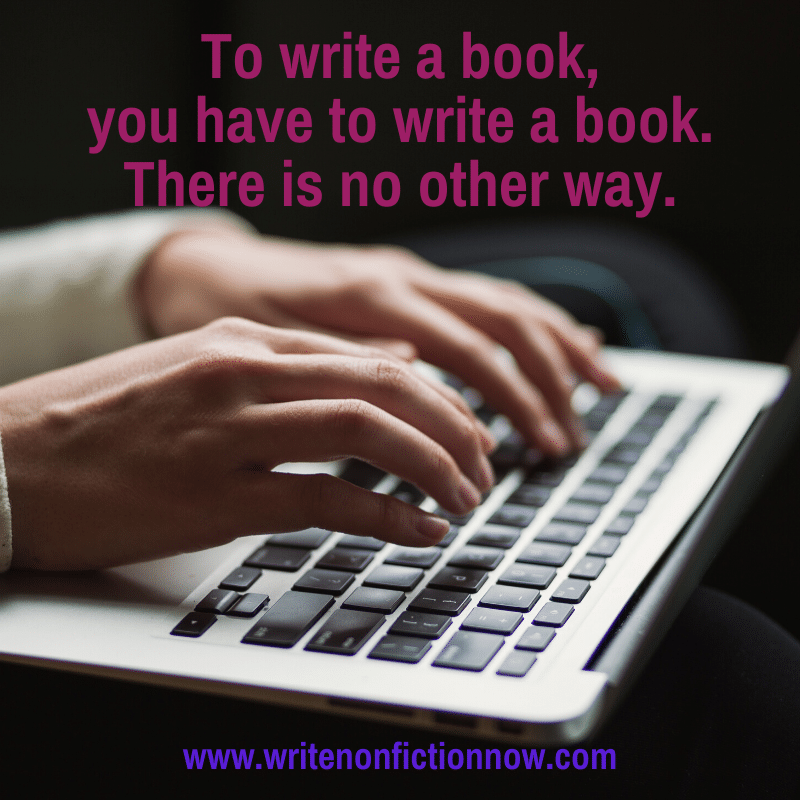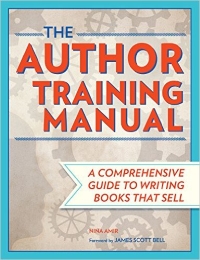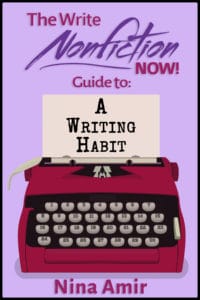 You can find tons of information online about how to write a nonfiction book. In fact, you could spend days, weeks, even months learning all the ins and outs of writing a nonfiction book. Ultimately, though, you have to apply what you know. You must sit down and write the book. That’s the only way you will become an author.
You can find tons of information online about how to write a nonfiction book. In fact, you could spend days, weeks, even months learning all the ins and outs of writing a nonfiction book. Ultimately, though, you have to apply what you know. You must sit down and write the book. That’s the only way you will become an author.
You can learn “how” until you are blue in the face, but knowledge won’t write the book for you. You have to do that.
You have to begin on page one—first word and first sentence—and continue writing consistently until you reach the last page of the manuscript. As you write, apply the knowledge you gained about how to write a successful book. That’s the way to complete a nonfiction book project.
Simply said, to write a book, you have to write a book. There is no other way.
Of course, you could speak your book and then edit transcripts. Or you could hire a ghostwriter. But if you want to be a writer and an author, you have put your fingers on the keyboard and write.
Recently, I published a quick three-part guide to writing a successful nonfiction book. You don’t need much more education than what I’ve provided in these challenges. In Part 1 of this series, I stressed planning before you begin writing your nonfiction book. In Part 2, I explained how to increase your book’s chances of selling well. And in Part 3, I taught you how to decide on your book’s structure and content.
Now, it’s time to begin writing. That’s the final challenge.
Nonfiction Writer’s Challenge—Write Your Book
To complete this nonfiction writer’s challenge, write your book.
Beyond putting hands on the keyboard and typing, use the following five steps to complete this challenge.
1. Determine how long it will take you to write your nonfiction book. ####
Many writers are put off by writing a book because they don’t know how long it will take them to do so. Some easy math will give you the clarity you need to get started.
First, you need to know the length of your book. Let’s assume you plan to write a full-length nonfiction book of 50,000 words. To determine the amount of time it will take you to complete this project, you need three pieces of information:
- the duration of your writing periods
- how many times per week you will write
- how many words you produce in an hour
 Get out your calendar. Decide how many days each week you can commit to writing and how many hours each of those days.
Get out your calendar. Decide how many days each week you can commit to writing and how many hours each of those days.
Next, set a timer for 60 minutes. Write without stopping for an entire hour. Repeat this exercise three times, preferably on a different day. Then, average your word count. (Add the three word-count totals together and divide by three to find the average.)
If you plan to write four times per week for two hours each time, you’ll complete eight hours of writing per week (4 x 2 = 8). If you write an average of 1,200 words per hour, you will produce about 9,600 words per week (2,200 x 8 =9,600). That means you could finish your book in just about five weeks.
When you realize how quickly you can finish the first draft of your book, you understand why so many writers choose to participate in 30-day writing challenges, like the Write Nonfiction in November Challenge (aka National Nonfiction Writing Month). Writing a book in a month is totally doable.
2. Schedule your daily or weekly writing blocks.
Too many writers fail to sit down with their calendar and block time to write. Even more fail to make these writing blocks nonnegotiable.
Don’t let that be you.
Get a calendar that allows you to block out the hours of the day. Then designate writing blocks on each day you plan to work on your book project.
Do not schedule anything when you are supposed to be writing. If it becomes necessary to do so—like your child needs an emergency trip to the doctor—move the writing block to an earlier or later time that day. Or schedule it on an “off day,” like on Saturday or Sunday.
You also can work backward. Give if you give yourself a deadline. Then determine how many words you need to produce per week to meet that deadline. Schedule your writing blocks accordingly.
3. Know what to write.
Remember how you planned out the content of your book? (If not, check out this post.) Put your chapter summaries or outline to use by scheduling your content.
Mark on your calendar what you will write about—what section of your chapter you will compose—during your next writing block. You might be able to plan this for the entire week. Or you may want to do it daily, depending upon how much writing you accomplish that day.
But don’t ever sit down to write without knowing what you will write. If you make this a habit, you’ll write quickly and effectively. Why? Because you’ll spend very little time staring at a blank screen wondering what to write next.
Your chapter summaries or outlines provide a writing guide. Use them well!
4. Write consistently.
 Now comes the writing part. Show up to your scheduled writing blocks religiously. And write…only write.
Now comes the writing part. Show up to your scheduled writing blocks religiously. And write…only write.
Do not research or edit at this time. Just write.
Write on a schedule. Write until the timer goes off. Don’t miss days.
Commit to your writing schedule. Make writing consistently your priority.
If you do, you’ll discover that you have created a writing habit. It will serve you well as you work on your current book project and those you take on in the future.
5. Defeat your negative mental chatter and urge to procrastinate.
If you are like most writers—or humans, you will find writing difficult if you listen to your negative mental chatter. That’s when you will procrastinate or, worse, quit.
Your thoughts will tell you that you are too tired to write, not good enough, have nothing to say, write poorly, are an imposter, will be judged (or worse, fail), and any number of other unsupportive things. Your job is to focus your attention on writing instead of this mental chatter.
Yes, each time you hear the mental chatter starting up, double down on your writing! Focus on that rather than the conversation in your head.
Remember, there are readers out there who need your book. And recall why you wanted to write the book in the first place—likely to fulfill your sense of purpose.
Your readers can’t wait forever to read your book; they need it now. And who knows what tomorrow will bring…so get your book written while you can.
The world needs more nonfiction writers like you to publish books that make a difference. Nonfiction books inspire and motivate change.
But before you publish a book, you must write it. Take this challenge to make sure you do just that.
If you missed any of the previous posts in the “How to Write a Successful Nonfiction Book” series, you can find them below:
After reading this four-part series, do you feel ready to write your book? Or do you have more questions or challenges? Let me know in a comment below. And please share this post with other aspiring writers.
 Would you like to write and publish nonfiction work, like articles, blog posts, books, or reports…and become a successful author? Check out the Nonfiction Writers’ University. Get the basic education you need and the coaching to help you succeed as a nonfiction writer. Take advantage of monthly live educational and group coaching events. Enjoy a 30-day trial membership for only $1.
Would you like to write and publish nonfiction work, like articles, blog posts, books, or reports…and become a successful author? Check out the Nonfiction Writers’ University. Get the basic education you need and the coaching to help you succeed as a nonfiction writer. Take advantage of monthly live educational and group coaching events. Enjoy a 30-day trial membership for only $1.
Do you want a more advanced approach to your nonfiction writing education? Join the Nonfiction Writers’ University MASTERS program. Receive ongoing live Certified High Performance Coaching (personal development), Author Training, and Authorprenuership Training as well as monthly educational and group coaching events. Learn all the steps to becoming a successful—and profitable—author. Discover how (finally) to write consistently, boldly, enthusiastically, and productively. Develop the mindsets, strategies, habits of the world’s most successful writers. Click here to learn more.
Photo courtesy of Kaitlyn Baker